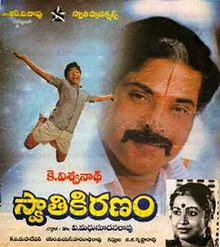
Swathi Kiranam is a 1992 Telugu-language musical drama film directed by K. Viswanath. Produced by V. Madhusudhana Rao, the film starred Mammootty in his Telugu debut, Master Manjunath and Radhika, along with Achyuth, Jayanthi, Sakshi Ranga Rao, Dubbing Janaki and Dharmavarapu Subramanyam in supporting roles. The film is about an egotistical music teacher envious of the immense talent of his prodigious young disciple, and depicts their tumultuous relationship.

Veturi Sundararama Murthy, known mononymously by his surname Veturi, was an Indian poet and lyricist who is known for his works in Telugu literature and cinema. Veturi is a recipient of the National Film Award, various Nandi Awards, Filmfare Awards, and other state honors. His career in Telugu cinema spanned more than four decades.

There were eminent mridangam artists like "Mrudanga Kesari" Mullapudi Lakshmana Rao and his son Mullapudi Sri Rama Murty. And his disciple " Mrudanga Shiromani" Dharmala Rama Murty and his son Dharmala Venkateshwara Rao. There were other legends like ML Lakshminarayana Raju and Kamalakara Rao.

Vijayashanti is an Indian actress, film producer and politician. In a film career spanning 40 years, she has acted in 187 feature films in a variety of roles in various languages predominantly in Telugu films, in addition to Tamil, Hindi, Kannada, and Malayalam films. She is widely referred as the "Lady Superstar", "Lady Amitabh", and "The Action Queen of Indian Cinema", She won the National Film Award for Best Actress for her work as a female cop in Kartavyam for depicting both aggression and feminity with balance and restraint (1990). She is a recipient of several accolades, including four Andhra Pradesh state Nandi Awards for Best Actress, seven Filmfare Awards South together with a Lifetime Achievement Award in 2003, and the Kalaimamani Award from Tamil Nadu Government.
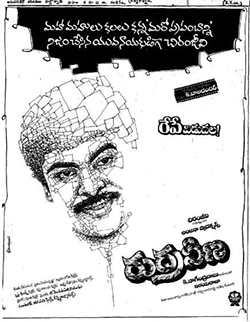
Rudraveena is a 1988 Indian Telugu-language musical-drama film directed and co-written by K. Balachander. Produced by Nagendra Babu's Anjana Productions, the film stars Chiranjeevi alongside Tamil actor Gemini Ganesan and Shobana. It also marked the acting debut of Kannada actor and filmmaker Ramesh Aravind in Telugu cinema. P. L. Narayana, Prasad Babu, Sumithra, Devilalitha, and Brahmanandam play supporting roles.

Raja Vikramarka is a 1990 Indian Telugu-language film directed by Ravi Raja Pinisetty, starring Chiranjeevi, Radhika and Amala. The film is inspired by the 1988 American film Coming to America. It was dubbed in Tamil as Sathiyama Naan Kavalkaran and in Hindi as Daulat Ki Duniya.

Swayamkrushi (transl. Self-made) is a 1987 Indian Telugu-language drama film written and directed by K. Viswanath. The film stars Chiranjeevi and Vijayashanti in main leads, with Sarvadaman D. Banerjee, and Sumalatha in other pivotal roles.
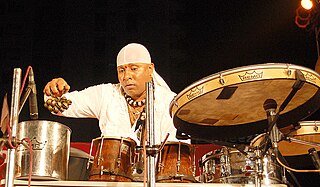
Anandan "Drums" Sivamani is an Indian percussionist. He plays many instruments including drums, octoban, darbuka, udukai, ghatam and kanjira. He performed drumming during the Indian Premier League in 2008 and 2010. He is affiliated with the Chennai Super Kings team, but gained recognition through his role as A. R. Rahman's lead percussionist. They have been close friends since childhood. In 2019, he was conferred with Padma Shri.
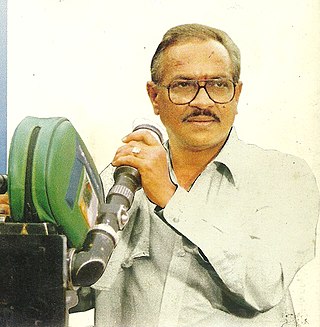
Jandhyala Subrahmanya Sastry, known mononymously as Jandhyala, was an Indian film director, screenwriter, and playwright known for his work in Telugu cinema and theatre. Popularly referred to as "Hasya Brahma", Jandhyala was celebrated for his exceptional contributions to comedy films. In a career spanning twenty five years, he directed more than 40 films and wrote dialogues for over 300 films.

Subha Sankalpam is a 1995 Indian Telugu-language film directed by K. Viswanath and produced by noted singer, S. P. Balasubrahmanyam. It stars Kamal Haasan, Aamani and Priya Raman, with Viswanath also playing a pivotal role. P. C. Sreeram handled the camera while M. M. Keeravani composed the music for the film. The film won five Nandi Awards and three Filmfare Awards. The film was later dubbed into Tamil language as Paasavalai.

Sunitha Upadrashta is an Indian playback singer and voice actor who primarily works in Telugu films. She is a recipient of nine Nandi Awards and two Filmfare Awards South in various categories. She also received a National Award from All India Radio under light music category when she was 15 years old. She received her first Nandi award in the year 1999 and bagged Nandi Awards in a row for the years 2002 to 2006 and again for the years 2010 to 2012. She was also honored with Lata Mangeshkar Best Singer Award for 2011 by the Government of Andhra Pradesh.

Ananda Bhairavi is a 1983 Indian bilingual dance film, simultaneously shot in Telugu and Kannada languages, written, and directed by Jandhyala. It starred Girish Karnad, Kathak dancer Malavika Sarkar, Rajesh and "Natyacharya" Bhagavathula Venkata Rama Sarma as a male classical dancer in this film. The film was premiered at International Film Festival of India. The film received positive reviews and has garnered the four state Nandi Awards.

Siri Siri Muvva is a 1976 Indian Telugu-language drama film written and directed by K. Viswanath. It stars Jaya Prada and Chandra Mohan. K. Viswanath later remade the film in Hindi with leading lady Jaya Prada, as Sargam, in 1979. Siri Siri Muvva was screened at the International Film Festival of India, and Moscow International Film Festival, and has received two National Film Awards.

Panduranga Mahatyam is a 1957 Indian Telugu-language biographical film, based on the life of Pundarika, produced by N. Trivikrama Rao under the National Art Theatres banner and directed by Kamalakara Kameswara Rao. It stars N. T. Rama Rao, Anjali Devi and B. Saroja Devi with music composed by T. V. Raju. The film was dubbed into Tamil as Annaiyum Pithavum Munnari Dheivam (1959) and it was again remade as the Telugu film Pandurangadu (2008).

Sri Krishna Satya is a 1971 Indian Telugu-language Hindu mythological film directed by K. V. Reddy. It stars N. T. Rama Rao and Jayalalithaa, with music composed by Pendyala. The film was produced by N. Trivikrama Rao. It was the last film directed by the noted filmmaker K. V. Reddy.

Aditya 369 is a 1991 Indian Telugu-language science fiction film written and directed by Singeetam Srinivasa Rao. The film stars Nandamuri Balakrishna and Mohini with supporting roles played by Amrish Puri, Tinnu Anand, and Suthivelu. The music was composed by Ilaiyaraaja, and the dialogues were written by Jandhyala. Produced by S. Anitha Krishna under the Sridevi Movies banner and presented by S. P. Balasubrahmanyam, the film was a commercial success. It also received critical acclaim earning two state Nandi Awards.

Karthavyam (transl. Duty) is a 1990 Indian Telugu-language political action film directed by Mohan Gandhi, starring Vijayashanti. Written by Paruchuri Brothers, the film is loosely based on the real-life story of police officer Kiran Bedi.

M. Ranga Rao was a prominent Indian composer who predominantly worked in Kannada cinema. Rao was known for his mellifluous scores and lilting tunes backed with strong classical nuances. "Ranga Rao" composed tunes for approximately 100 films in Kannada cinema.
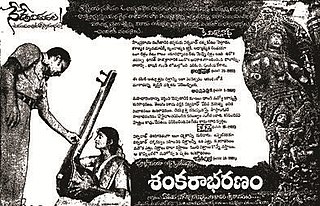
Shankarabharanam is a 1980 Indian Telugu-language musical drama film written and directed by K. Viswanath. Produced by Edida Nageswara Rao under Poornodaya Movie Creations, the film stars J. V. Somayajulu, Manju Bhargavi, Chandra Mohan, and Rajyalakshmi. The soundtrack was composed by K. V. Mahadevan. The film explores the cultural divide between Indian classical and Western pop music through the perspectives of characters from different generations.


















